Podcast Topic: COVID-19 Pandemic Impacts on Food
Podcast Topic: COVID-19 Pandemic Impacts on Food
 E197: USDA plans for online WIC Benefits
E197: USDA plans for online WIC Benefits
February 28, 2023
In February, 2023, the US Department of Agriculture announced plans to streamline and modernize WIC – the Women Infants and Children Program focused on supplemental nutrition. We’ll talk about the future of WIC today with Stacy Dean, the Deputy Undersecretary for USDA’s Food, Nutrition and Consumer Services.
Related podcasts: Child Development & Nutrition | COVID-19 Pandemic Impacts on Food | Equity, Race & Food Justice | Food Insecurity | Food Policy | Social Safety Net & Food |
 E186: Deep dive into challenges people face accessing food pantries
E186: Deep dive into challenges people face accessing food pantries
November 7, 2022
The COVID-19 pandemic deeply impacted the US food chain and has heightened attention on nonprofit food pantries and soup kitchens. Today’s guest argues that sometimes the people most in need of food face the most challenges in getting it because of food pantry operating procedures. Our guest, Alana Stein has conducted research on these issues at the University of California at Davis.
Related podcasts: COVID-19 Pandemic Impacts on Food | Diet & Nutrition | Equity, Race & Food Justice | Food Banks, Food Pantries & Soup Kitchens | Food Insecurity |
 E184: Carolina Farm Stewardship Association – Connecting Farmers & Communities
E184: Carolina Farm Stewardship Association – Connecting Farmers & Communities
October 26, 2022
Today we’re speaking with Roland McReynolds, Executive Director of the Carolina Farm Stewardship Association which is a member-based farmer-driven, non-profit organization based in Pittsboro, North Carolina, that helps farmers and consumers in both North and South Carolina grow and eat local organic food.
Related podcasts: Agriculture & Tech | Community & Economic Development | COVID-19 Pandemic Impacts on Food | North Carolina | Voice of Farming |
 E176: Insights from a nationwide survey of hunger relief organizations during COVID
E176: Insights from a nationwide survey of hunger relief organizations during COVID
July 20, 2022
During the early days of the COVID-19 pandemic in 2020, much of the US was in lockdown. Many people had lost jobs or could not work from home during that time and struggled to pay their bills. Shortages of food and other basic necessities were common. Many people needed help during this time. Charitably-funded volunteer staff organizations like soup kitchens and food pantries suddenly found themselves on the front line of a massive ongoing food relief emergency. Many of them did heroic work. We’re speaking today with the co-authors of a new report titled, “The Impact of the COVID-19 Pandemic on US Hunger Relief Organizations, from August and November of 2020.” Gizem Templeton is a researcher at Duke University’s World Food Policy Center. Alison Cohen, formerly of WhyHunger, is a research consultant on the project. And Suzanne Babb is the director of US programs at WhyHunger.
Related podcasts: COVID-19 Pandemic Impacts on Food | Equity, Race & Food Justice | Food Banks, Food Pantries & Soup Kitchens | Food Insecurity | Food Policy | Philanthropy & Food Systems |
 E154: Micropantries and Community Resilience during the COVID-19 Pandemic
E154: Micropantries and Community Resilience during the COVID-19 Pandemic
January 21, 2022
Today, we’re going to speak about micropantries as a form of community resilience in the face of the food insecurity exacerbated by the COVID-19 pandemic. Our guests today are Reverend Wendy Miller Olapade of the United Church of Christ in Medford, Massachusetts, professor Norbert Wilson, who’s Professor of Food Economics and Community at Duke University, and lead author of a recent paper on micropantries in the Journal of Nutrition Education and Behavior, Sara Folta, with the Tufts Friedman School of Nutrition, Science, and Policy.
Related podcasts: Community & Economic Development | COVID-19 Pandemic Impacts on Food | Faith & Food | Food Insecurity | Social Safety Net & Food |
 E151: MAZON’s support for Indian Food Sovereignty, Puerto Rico, and Quick Response Food Advocacy
E151: MAZON’s support for Indian Food Sovereignty, Puerto Rico, and Quick Response Food Advocacy
December 16, 2021
We’re speaking today with Mia Hubbard, vice president of programs at MAZON, a Jewish response to hunger, which is a national advocacy organization working to end hunger among people of all phase and backgrounds in the United States and in Israel. This is the fifth and final episode in our series partnership with MAZON. This time we will focus on the organization’s work to increase access to nutritious foods in the charitable food network.
Related podcasts: Advocacy & Food | COVID-19 Pandemic Impacts on Food | Equity, Race & Food Justice | First Nations Food Issues | Food Insecurity |
 E145: A Strategy to Improve SNAP Impact Through the Next Farm Bill
E145: A Strategy to Improve SNAP Impact Through the Next Farm Bill
October 12, 2021
In 2023, the U.S. will reauthorize the Supplemental Nutrition Assistance Program, known as SNAP, as part of the massive Farm Bill. In the aftermath of the COVID-19 lockdowns and unprecedented innovations to SNAP benefits and delivery, what should the future program look like? As one of the country’s most important social safety nets, SNAP is a proven policy for stabilizing the economy, lifting Americans out of poverty, reducing food insecurity, and improving health while also reducing healthcare costs. In anticipation of this reauthorization, the Robert Wood Johnson Foundation’s Healthy Eating Research Program published a new report entitled “Strengthening the Public Health Impacts of SNAP: Key Opportunities for the Next Farm Bill.” The report identified the evidence-based changes that have the greatest potential to improve SNAP participants’ nutrition and their overall health. And the stakes on this are really high because the lives of so many people are affected. Today, we’ll be talking with Duke University’s Megan Lott, deputy director of the Robert Wood Johnson Foundation’s Healthy Eating Research Program, and coauthor Catherine Woteki, former under secretary for the USDA’s Research, Education, and Economics mission areas, who is now on the faculty of Iowa State University and at the University of Virginia, and she’s also the president of the Charles Valentine Riley Memorial Foundation.
Related podcasts: Advocacy & Food | Child Development & Nutrition | COVID-19 Pandemic Impacts on Food | Equity, Race & Food Justice | Food Insecurity | Food Policy | Social Safety Net & Food |
 E143: Improved Child Tax Credit Will Lift Many Out of Poverty
E143: Improved Child Tax Credit Will Lift Many Out of Poverty
September 28, 2021
As many as 13 million children in the United States live in food insecure homes, meaning that these households don’t have enough food for every family member to lead a healthy life. Hunger is a problem that most often affects children from low-income families. And today we’re going to discuss the Child Tax Credit aimed at helping low-income families and the historic increases in the credit made through the American Rescue Plan in 2021. Our guest today is Billy Shore, the founder and executive chair of Share Our Strength, a nonprofit working to solve problems of hunger and poverty, both in the United States and around the world. Share Our Strength is also the parent organization for the well-known No Kid Hungry campaign, the national policy, advocacy, outreach, and research effort to improve childhood nutrition, support school meals, and provide resources to schools, food banks, and community groups working to end hunger.
Related podcasts: COVID-19 Pandemic Impacts on Food | Food Insecurity | Food Policy | Social Safety Net & Food |
 E135: How did SNAP do during COVID and What Changes Need to Stay?
E135: How did SNAP do during COVID and What Changes Need to Stay?
July 20, 2021
The COVID-19 pandemic changed our lives and led to mandated business and school closures, families and communities all around the country experienced record levels of unemployment and record levels of food insecurity. This led to unprecedented policy innovation designed to increase access to nutritious food through the supplemental nutrition assistance program, known as SNAP. The program that was formerly known as Food Stamps. In today’s podcast, we’ll talk with the authors of a new report entitled, Supplemental Nutrition Assistance Program Waivers and Adaptations During the COVID-19 Pandemic, A Survey of State Agency Perspectives in 2020.
Related podcasts: COVID-19 Pandemic Impacts on Food | Food Insecurity | Food Policy | Social Safety Net & Food |
 E98: The COVID-19 Pandemic Response of No Kid Hungry
E98: The COVID-19 Pandemic Response of No Kid Hungry
November 9, 2020
This podcast is part of a series focused on the far-reaching impact of the COVID-19 pandemic on the food system. Today we’re looking at how responses to the pandemic have affected food availability and nutrition for one of America’s most vulnerable populations – young children. Joining me is Eleni Towns, the Associate Director of the No Kid Hungry Campaign at Share Our Strength.
Related podcasts: Advocacy & Food | COVID-19 Pandemic Impacts on Food | Diet & Nutrition | Food Banks, Food Pantries & Soup Kitchens | Food Insecurity | Food Policy | Philanthropy & Food Systems | Social Safety Net & Food |

 E197: USDA plans for online WIC Benefits
E197: USDA plans for online WIC Benefits E186: Deep dive into challenges people face accessing food pantries
E186: Deep dive into challenges people face accessing food pantries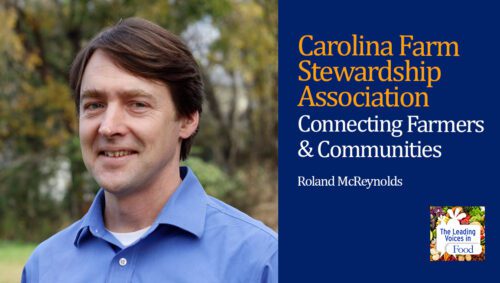 E184: Carolina Farm Stewardship Association – Connecting Farmers & Communities
E184: Carolina Farm Stewardship Association – Connecting Farmers & Communities E176: Insights from a nationwide survey of hunger relief organizations during COVID
E176: Insights from a nationwide survey of hunger relief organizations during COVID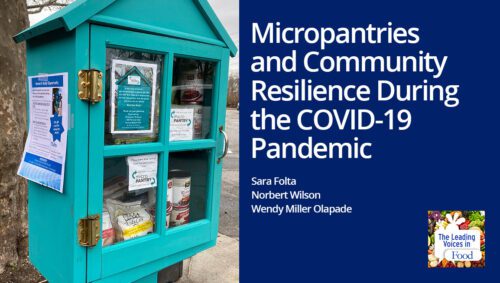 E154: Micropantries and Community Resilience during the COVID-19 Pandemic
E154: Micropantries and Community Resilience during the COVID-19 Pandemic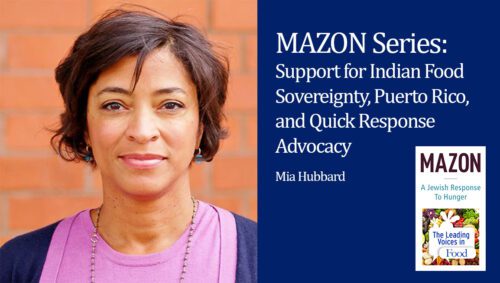 E151: MAZON’s support for Indian Food Sovereignty, Puerto Rico, and Quick Response Food Advocacy
E151: MAZON’s support for Indian Food Sovereignty, Puerto Rico, and Quick Response Food Advocacy E145: A Strategy to Improve SNAP Impact Through the Next Farm Bill
E145: A Strategy to Improve SNAP Impact Through the Next Farm Bill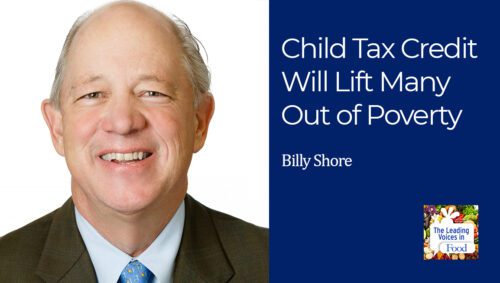 E143: Improved Child Tax Credit Will Lift Many Out of Poverty
E143: Improved Child Tax Credit Will Lift Many Out of Poverty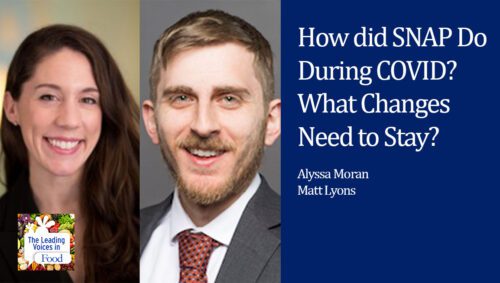 E135: How did SNAP do during COVID and What Changes Need to Stay?
E135: How did SNAP do during COVID and What Changes Need to Stay? E98: The COVID-19 Pandemic Response of No Kid Hungry
E98: The COVID-19 Pandemic Response of No Kid Hungry